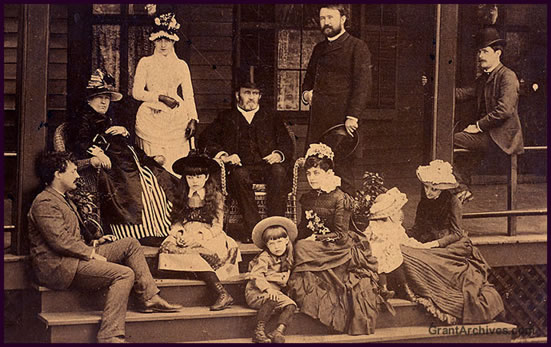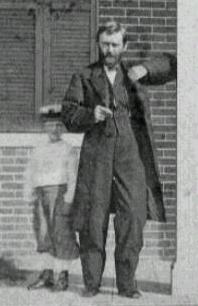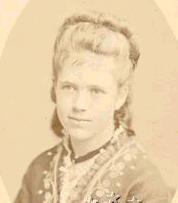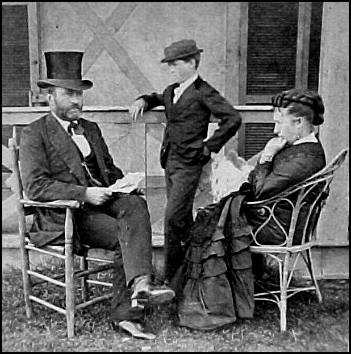GRANT THE FAMILY MAN

General Grant was an extraordinarily responsible and devoted father and husband. He was extremely loving and kind towards his wife and children and was always considered a hero in the eyes of his family. Perhaps General Grant was the most ethical and moral family man and U. S. President that we ever had. The recollection that his wife, children and grandchildren had of him was of the highest caliber.
Ulysses and Julia Grant had four children:
|

Grant was an uncommonly devoted parent and expressed his affection for his children in his letters and in his actions. In an era when most fathers physically manhandled their children, he was lenient to a fault. He particularly spoiled his two youngest children, Nellie and Jesse, and they were his special favorites. Horace Porter, one of Grant's staff officers, recalled, "the children often romped with him and he joined in their frolics as if they were all playmates together. The younger ones would hang around his neck while he was writing, make a terrible mess of the papers, and turn everything in his tent into a toy."
The General's wife, Julia, had no illusions about who was the true disciplinarian in the family. She recalled, "The General had no idea of the government of the children. He would have allowed them to do pretty much as they pleased (hunt, fish, swim, etc.) provided it did not interfere with any duty, but his word was law always. Whenever they were inclined to disobey or question my authority, I would ask the General to speak to them. He would, smiling at me, and say to them, 'Come, come Fred, or Nell, you must not quarrel with Mama. She knows what is best for you and you must always obey her.'"
Not surprisingly, the Grant children had various personalities and Grant related to them differently. Fred spent his life in the role of Grant's eldest son, and was diplomatic and concerned with how others judged him. Academically, he struggled at West Point, amassing an embarrassing collection of demerits and it took him five years to graduate. Grant immediately placed Fred on General Sherman's staff, but the hero of Atlanta was a reluctant party to the move. He confided to General Ord, "As to playing courtier by taking Fred Grant on my staff, I won't - I took him to Europe and got no thanks for it. Fred is good enough, but there are other officers on my own staff of more merit and claim on my personal kindness."
Buck, the Grant's second son, was dreamy and quiet, and preferred to remain in the background. During the Civil War, he frequently stayed behind with his grandparents when his siblings visited camp, and was reticent and shy for the remainder of his life. Of all the children, he spent the least actual time with Grant, though they remained close. When he grew older, he strongly resembled his namesake father, particularly when he grew a beard. Buck was the only one of Grant's children to succeed in business and spent his later years maintaining and operating the opulent U.S. Grant Hotel in San Diego, California. The hotel still flourishes today.
Nellie, Grant's only daughter was his favorite and he lavished her with attention and tenderness. She was a fun-loving adolescent and loved parties, dances and the attention of young men. Grant never found fault with her and he spoiled her so conspicuously that it became an item of gossip in Washington. He bitterly opposed her 1874 marriage to Algernon Sartoris, an Englishman of limited maturity and a conspicuous, grating vanity. Nellie was only 18 and Grant didn't like her living abroad and away from the family. After her marriage ceremony in the White House, servants searched in vain for the General. They finally found him in Nellie's bedroom, sobbing without restraint into her pillow. His surviving letters to her are droll and affectionate. He never failed to inquire about the son-in-law he had opposed, though it seems convention, and not genuine solicitude, was behind the questions. He urged her frequently to return to the United States and raise her children as American citizens. Nellie divorced Algie after her father's death and lived with her children in her mother's house in Washington, D.C.

Jesse, the Grant's youngest child, was the family comedian and was an original child. Grant adored his personality, which was very different from his own, and he enjoyed bantering and teasing him. They wrestled together on the floor and Jesse was partial to playing "horsie" while riding on Grant's back. Jesse spent much of his childhood in camp with his father, though he later admitted he was too young to recall much detail. He wrote a book of reminiscences in 1925 (largely ghostwritten) entitled, In The Days Of My Father, General Grant. Considering Jesse's intimacy with his father, the book is disappointing in content. Jesse grew up to be an irreverent adult who actually ran for President on the Democratic ticket in 1908 (needless to say, his candidacy was lightly regarded). It is said by intimates of the family that Jesse was Julia's favorite child.

Unfortunately, Nellie Grant did not speak publicly about her father in later years and there are few, if any, interviews conducted with her. However, the General's sons did speak and write about him to a variety of sources and left behind a rich tapestry in describing their father's habits, personality and private feelings. Click on the links above to read what Grants sons said about their father. |


